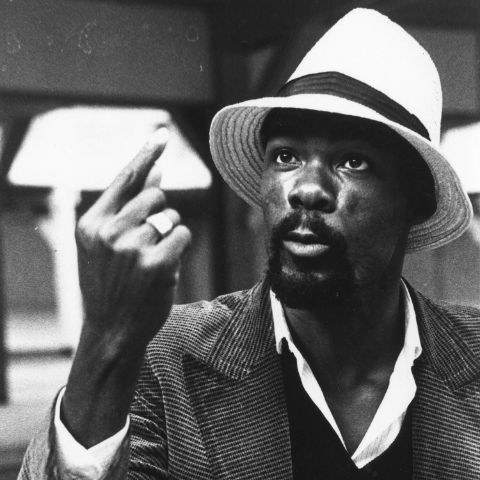Dowdelin, Erick Cosaque
Concert
20:00 Dowdelin
21:00 Erick Cosaque
Fri., 25.8.2023
20:00
Paulette Nardal Terrace
Evening ticket €18/14
Open air on the Paulette Nardal Terrace

Erick Cosaque, 1989. Photo: Jean Raison
Dowdelin
Concert
Active since 2016, Dowdelin are a quartet with a unique, trans-Atlantic sound influenced by Guadeloupean gwo ka, Martinican biguine, dancehall, jazz, and R&B, as well as West African grooves and electronic music. The Afro-futuristic Creole they perform embraces and celebrates the cultural hybridization of the sonic diaspora.
Erick Cosaque
Concert
In the universe of gwo ka, Erick Cosaque is one of the most paramount and outstanding figures. The 71-year-old Guadeloupean artist has contributed significantly to the shaping and dissemination of gwo ka music, gwo ka aesthetics, politics and philosophies since the 1970s—from the 1978 release of one of his earliest albums in the constellation Cosaque Et Les Voltages 8, titled Chéne A Kunta-Kinté,until his most recent anthology titled Chinal Ka 1973 -1995, released in 2019.
Gwo ka is more than a music genre. With instruments like the boula and makè drums known as Ka, the wooden sticks ti-bwa, and the grain-filled calabash chacha, gwo ka tells the violent histories of enslavement and the plantation enterprise, as well as of the resistances and the imagination and building of other egalitarian and emancipated societies by freed Africans in the so-called new world. Gwo ka brought together different African sound heritages through a Creole practice that has been passed from generation to generation and is sung in Guadeloupean Creole. At the base of gwo ka are seven rhythms: léwoz, kaladja, pagenbel, toumblak, grage, roul, and mindé, which are sonic manifestations of forms of survival, rebellion, and emancipation in the face of oppression, as well as celebrations of community life. It comes thus as no surprise that gwo ka was taken up on UNESCO’s Representative List of the Intangible Cultural Heritage of Humanity in 2014.
When Cosaque was 5 years old, he was introduced to gwo ka by his father, a stevedore and dice player, whom he used to accompany to communal celebrations. At the age of 14, Cosaque met Guy Conquette who was one of his great influences, being not only a musician but also a recognized leader with strong political messages that emphasized a sense of belonging and identity found in music, which, due to its origins, continued to be marginalized by the colonial regime. During his adolescence, Cosaque participated in several local gwo ka bands where he met and learned different styles and obtained training as a musician and heir to this tradition.
In the 1970s, Cosaque emerged as a professional musician, and played an important role in the founding of three fundamental gwo ka bands: Negro ka, Les Voltajes 8, and X7 Nouvelles Dimensions. Cosaque is credited as one of the first artists to add wind instruments, synthesizers, and guitars to gwo ka, as well as bring in influences from Haitian kompa and Dominican cadence and calypso. To date Cosaque has recorded more than twenty solo albums and has stoically maintained a musical career that has managed to sustain itself independently of institutions, record labels, or any alliance that could compromise the free spirit that his music contains. For him, gwo ka is more than music, it is a way of being.